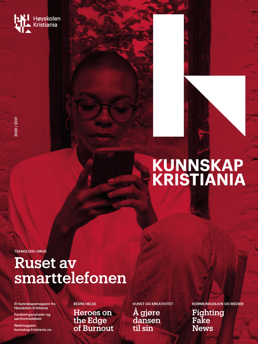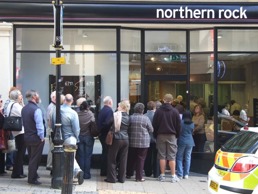What happens when your bank shares your information with other companies?
-
Sist oppdatert
30. oktober 2024
-
Kategori
Open banking promises more innovative and customer-friendly financial services. But is it safe?
SCIENCE NEWS FROM KRISTIANIA: Financial technology
The world of banking is changing fast. What used to be an industry dominated by big banks has opened up to new, smaller players called fintechs (financial technology companies).
Banks are no longer just providers of financial services. They have become platforms that connect customers with fintechs, reshaping how we handle our money.
A new law changed our way of managing money
Thanks to a set of European laws known as the Revised payment services directive (PSD2), fintechs can now use information from banks to offer innovative services, creating new ways to manage and use money.
– This law has created an entirely new relationship between banks and fintechs, says Ahmad Ghazawneh, associate professor at School of Economy, Innovation and Technology at Kristiania University College.
– While there are challenges – like security risks and increased competition – the potential benefits of open banking are too big to ignore. If banks can navigate this complex relationship with fintechs, the future of banking could be more innovative and customer-friendly than ever before, he says.

Welcome to Kristiania Breakfast, 7th November
Banks have to share customer data
Open banking, a term you might have heard before, is essentially a system where banks allow third-party companies (like fintechs) to access customer data with their permission. Normally, banks keep this information to themselves, but PSD2 forces banks to share this information with licensed fintechs. The main goal of open banking is to promote innovation and offer customers more choices when it comes to financial services.
For example, instead of only applying for a loan through your bank, you could use a fintech app like Klarna to compare different offers and manage your finances. These apps can make things quicker, cheaper, and easier for customers because they can use real-time data straight from your bank.
Are banks and fintechs partners or rivals?
One of the main questions Ghazawneh and Osama Mansour (University of Lund) explores in a study they carried out, is whether banks and fintechs are partners or rivals.
Banks have traditionally dominated the financial world because they control all the customer data. But with open banking, fintechs have access to this data, which means they can create similar or even better financial services. This creates a complex relationship where fintechs depend on banks for data, while banks rely on fintechs to offer more innovative services.
– Banks can no longer act as gatekeepers, controlling all the information and services. Instead, they have to collaborate with fintechs and become “orchestrators”, says Ghazawneh.
This means that banks now work behind the scenes, managing the flow of data and ensuring that fintechs can offer their services smoothly.

Temautgave: teknologi i bruk
A new chapter in banking
The PSD2-directive requires banks to provide basic access through APIs (application programming interfaces). These are tools that allow fintechs to connect to a bank’s data.
Some banks are offering so called “Premium APIs. These give fintechs even more options for interacting with the bank. For example, fintechs like Vipps create services such as real-time payment updates and easy peer-to-peer transfers, while Klarna offers automated loan applications.
In this way, banks are not just banks anymore. They act like a platform that helps other companies deliver financial services. Customers might not even realize they’re using a bank’s infrastructure because they’re interacting directly with fintech apps.
– We call this “invisible banking” or embedded finance, where the bank works in the background to make sure everything runs smoothly, but the customer’s experience happens through the fintech’s app, says Ghazawneh.

Read more:
The risks of open banking
Of course, this new world of open banking isn’t without risks.
– Banks now have less control over who can use their data and how it’s used. PSD2 requires banks to share data with any licensed fintech, which could include potential competitors, says Ghazawneh.
This means that while banks are enabling new services, they are also opening themselves up to competition from tech giants like Apple or Amazon, which are moving into financial services.
There are also concerns about security and privacy. With more companies accessing customer data, it becomes harder to ensure that this data is always protected. Banks are responsible for keeping data safe, but they have less control over how third parties manage it.
Collaboration benefits customers
So, what’s the future of banking in this new era? According to Ghazawneh, banks need to embrace their role as platforms. Instead of viewing fintechs as competitors, they should see them as partners who can help offer better services to customers. For example, by collaborating with fintechs, banks can improve customer experiences and provide services that would be difficult to build on their own.
– While there will always be competition, the banks that can successfully manage partnerships with fintechs will have a better chance of staying relevant in a rapidly changing industry, says Ghazawneh.
What is Open Banking?
Open banking is also known as "open bank data." Open banking is a banking practice that provides third-party financial service providers open access to consumer banking, transaction, and other financial data from banks and non-bank financial institutions through the use of application programming interfaces (APIs). Open banking allows the networking of accounts and data across institutions for use by consumers, financial institutions, and third-party service providers. Open banking is reshaping the competitive landscape and consumer experience of the banking industry. While promising in many ways, there is also potential risks to consumers as more of their data is shared more widely.
What is Fintech?
Financial technology (fintech) is technology used to automate financial services. Specialized software and algorithms can be used on computers and smartphones and include robo-advisors, payment apps, peer-to-peer (P2P) lending apps, investment apps, and crypto apps, among others. It is used not only in retail banking, but also in fundraising, nonprofit and investment management, to name a few. Fintech also includes the development and use of cryptocurrencies, such as Bitcoin. Financial services companies can use fintech to improve their delivery to consumers and use technology to cut down on operational costs as well as expand financial inclusion. (Investopedia.com)
Text: Cecilie Taran Skjerdal, seniorrådgiver, avd. forskningskommunikasjon og innovasjon, Kristiania
Reference:
Mansour, O. & Ghazawneh, A. (2023). The Evolving Interdependencies between Banks and Fintechs within Open Banking Platforms. Conference paper. Forty-Fourth International Conference on Information Systems, Hyderabad, India 2023.
We love hearing from you!
Send your comments and questions regarding this article by e-mail to kunnskap@kristiania.no.
Siste nytt fra Kunnskap Kristiania
 Kunnskap KristianiaLes mer
Kunnskap KristianiaLes merWhat happens when your bank shares your information with other companies?
Open banking - is the promise of innovative and customer-friendly financial services safe? Kunnskap KristianiaLes mer
Kunnskap KristianiaLes merArbeiderpartiet formet norsk politisk kommunikasjon
Arbeiderpartiet har lenge vært i forkant i utviklingen av politisk kommunikasjon i Norge. Kunnskap KristianiaLes mer
Kunnskap KristianiaLes merEr influensere underholdning, informasjon eller reklame?
Vi må være mer bevisste på hvordan vi lar oss påvirke av influensere. Kunnskap KristianiaLes mer
Kunnskap KristianiaLes merKommunen skapte skeive Carl (74) for bedre dialog med LHBTQ+-eldre
Tidligere var eldre LHBTQ+ fraværende i kommunens strategier for omsorg og tjenester.


